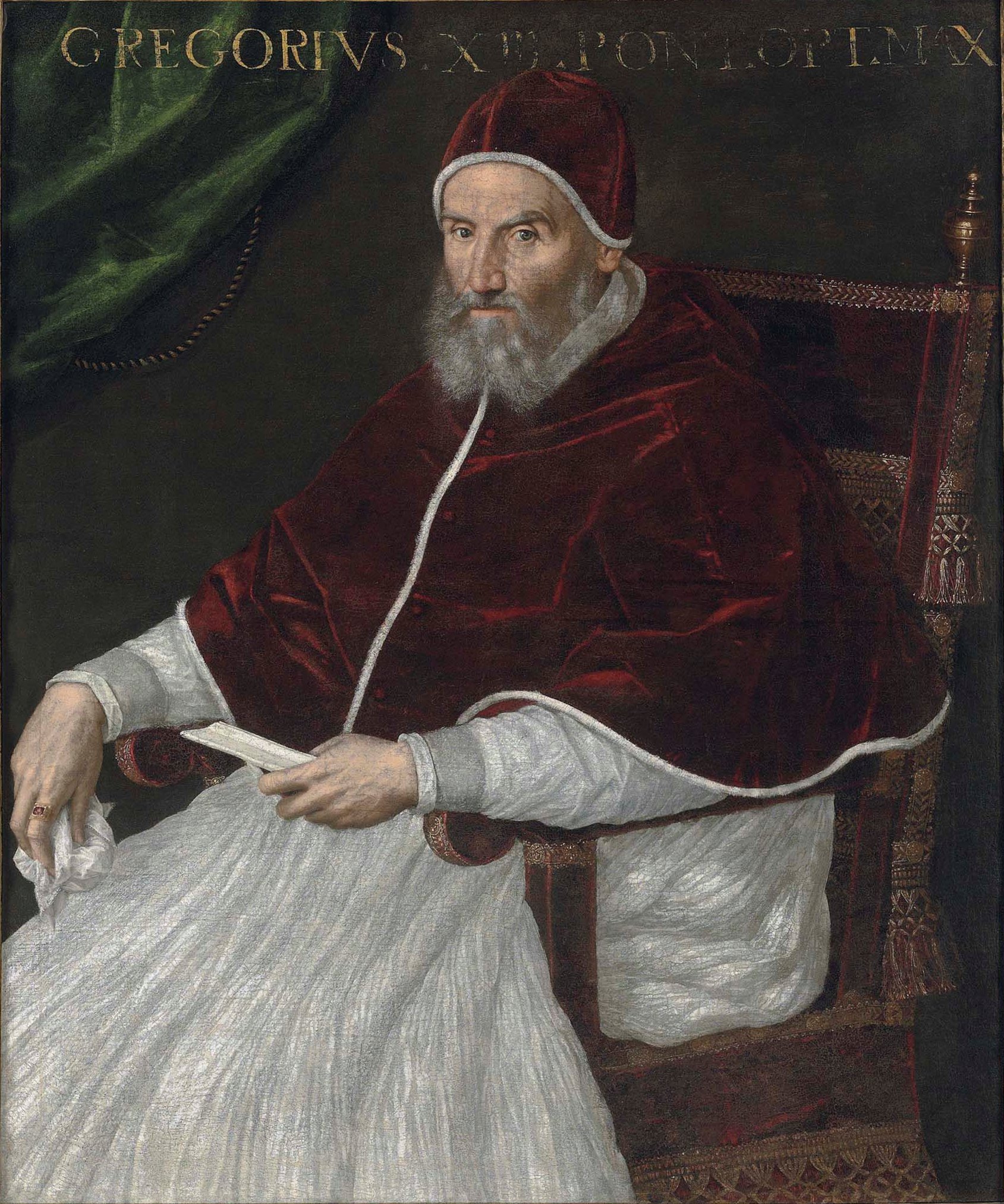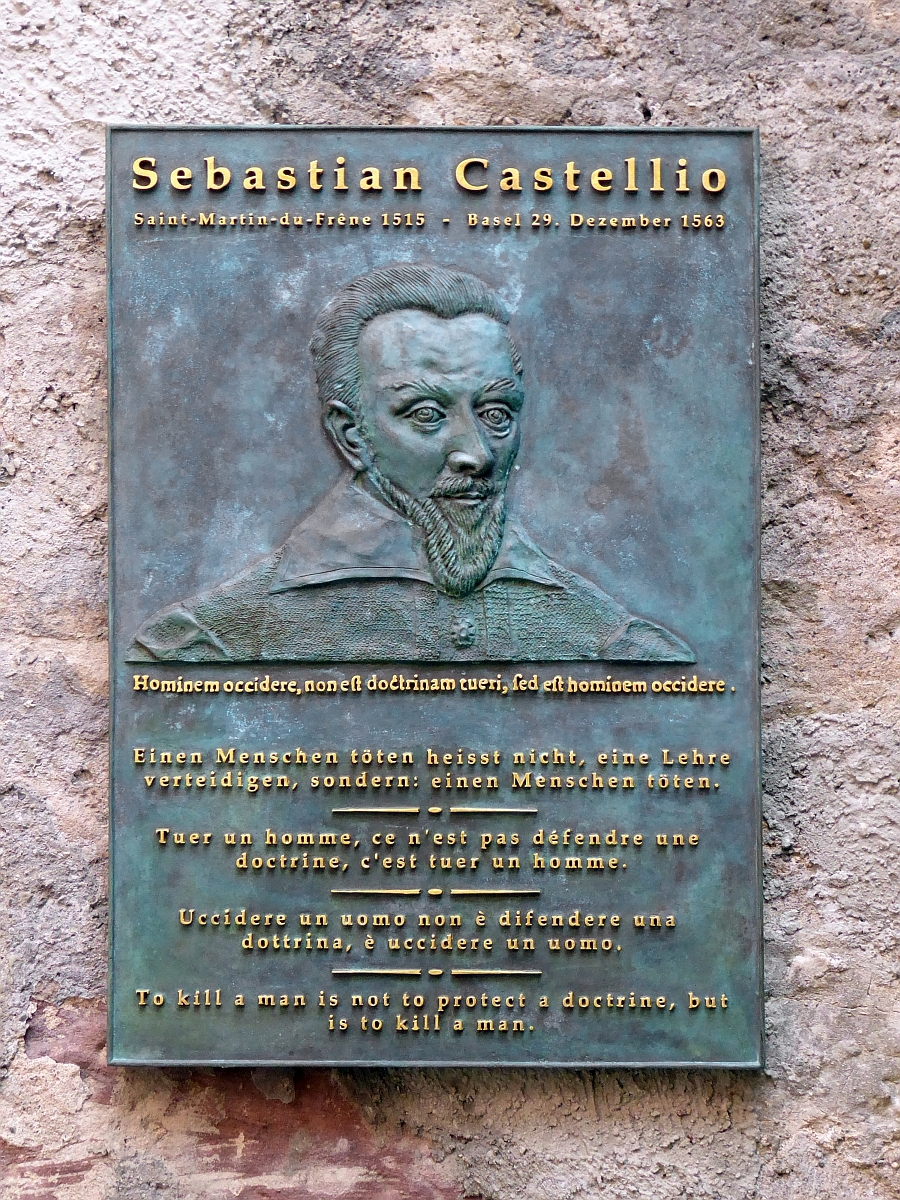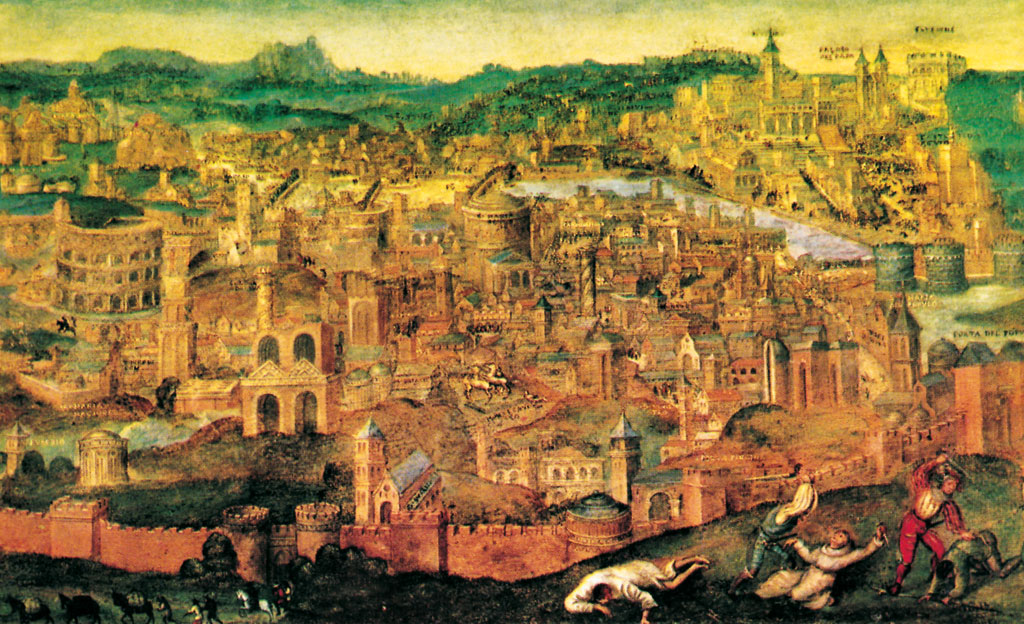|
Lelio Gregorio Giraldi
Giglio Gregorio Giraldi (Lilius Gregorius Gyraldus or Giraldus) (14 June 1479 – February 1552) was an Italian classical scholar and poet. Biography Giglio Gregorio Giraldi was born at Ferrara, where he early distinguished himself by his talents and acquirements. On the completion of his literary course, he removed to Naples, where he lived on familiar terms with Jovianus Pontanus and Sannazaro; and subsequently to Lombardy, where he enjoyed the favour of the Mirandola family. At Milan in 1507 he studied Greek under Chalcondylas; and shortly afterwards, at Modena, he became tutor to Ercole (afterwards Cardinal) Rangone. About the year 1514, he removed to Rome, where, under Clement VII, he held the office of apostolic protonotary; but having in the sack of that city (1527), which almost coincided with the death of his patron Cardinal Rangone, lost all his property, he returned in poverty once more to Mirandola, whence again he was driven by the troubles consequent on the ass ... [...More Info...] [...Related Items...] OR: [Wikipedia] [Google] [Baidu] |
Ferrara
Ferrara (; ; ) is a city and ''comune'' (municipality) in Emilia-Romagna, Northern Italy, capital of the province of Ferrara. it had 132,009 inhabitants. It is situated northeast of Bologna, on the Po di Volano, a branch channel of the main stream of the Po (river), Po River, located north. The town has broad streets and numerous palaces dating from the Renaissance, when it hosted the court of the House of Este. For its beauty and cultural importance, it has been designated by UNESCO as a World Heritage Site. History Antiquity and Middle Ages The first documented settlements in the area of the present-day Province of Ferrara date from the 6th century BC. The ruins of the Etruscan civilization, Etruscan town of Spina, established along the lagoons at the ancient mouth of Po river, were lost until modern times, when drainage schemes in the Valli di Comacchio marshes in 1922 first officially revealed a necropolis with over 4,000 tombs, evidence of a population centre that in ... [...More Info...] [...Related Items...] OR: [Wikipedia] [Google] [Baidu] |
Greek Language
Greek (, ; , ) is an Indo-European languages, Indo-European language, constituting an independent Hellenic languages, Hellenic branch within the Indo-European language family. It is native to Greece, Cyprus, Italy (in Calabria and Salento), southern Albania, and other regions of the Balkans, Caucasus, the Black Sea coast, Asia Minor, and the Eastern Mediterranean. It has the list of languages by first written accounts, longest documented history of any Indo-European language, spanning at least 3,400 years of written records. Its writing system is the Greek alphabet, which has been used for approximately 2,800 years; previously, Greek was recorded in writing systems such as Linear B and the Cypriot syllabary. The Greek language holds a very important place in the history of the Western world. Beginning with the epics of Homer, ancient Greek literature includes many works of lasting importance in the European canon. Greek is also the language in which many of the foundational texts ... [...More Info...] [...Related Items...] OR: [Wikipedia] [Google] [Baidu] |
1479 Births
Year 1479 ( MCDLXXIX) was a common year starting on Friday of the Julian calendar. Events January–December * January 20 – Ferdinand II ascends the throne of Aragon, and rules together with his wife Isabella I, Queen of Castile, over most of the Iberian Peninsula. * January 25 – The Treaty of Constantinople is signed between the Ottoman Empire and Republic of Venice, ending sixteen years of war between the two powers; Venice will cede Negroponte, Lemnos and Shkodër, and pay an annual sum of 10,000 gold ducats. * April 25 – Ratification of the Treaty of Constantinople in Venice ends the Siege of Shkodra after fifteen months, and brings all of Albania under the Ottoman Empire. * May 13 – Christopher Columbus, an experienced mariner and successful trader in the thriving Genoese expatriate community in Portugal, marries Felipa Perestrelo Moniz (Italian on her father's side), and receives as dowry her late father's maps and papers, charting ... [...More Info...] [...Related Items...] OR: [Wikipedia] [Google] [Baidu] |
Pope Gregory XIII
Pope Gregory XIII (, , born Ugo Boncompagni; 7 January 1502 – 10 April 1585) was head of the Catholic Church and ruler of the Papal States from 13 May 1572 to his death in April 1585. He is best known for commissioning and being the namesake for the Gregorian calendar, which remains the internationally accepted civil calendar to this day. Early biography Youth Ugo Boncompagni was born the son of Cristoforo Boncompagni (10 July 1470 – 1546) and Angela Marescalchi, and paternal grandson of Giacomo Boncompagni and Camilla Piattesi, in Bologna, where he studied law and graduated in 1530. He later taught jurisprudence for some years, and his students included notable figures such as Cardinals Alexander Farnese, Reginald Pole and Charles Borromeo. He had an illegitimate son after an affair with Maddalena Fulchini, Giacomo Boncompagni, but before he took holy orders, making him the last Pope to have left issue. Career before papacy At the age of 36 he was summoned to Rome ... [...More Info...] [...Related Items...] OR: [Wikipedia] [Google] [Baidu] |
Gregorian Calendar
The Gregorian calendar is the calendar used in most parts of the world. It went into effect in October 1582 following the papal bull issued by Pope Gregory XIII, which introduced it as a modification of, and replacement for, the Julian calendar. The principal change was to space leap years slightly differently to make the average calendar year 365.2425 days long rather than the Julian calendar's 365.25 days, thus more closely approximating the 365.2422-day tropical year, "tropical" or "solar" year that is determined by the Earth's revolution around the Sun. The rule for leap years is that every year divisible by four is a leap year, except for years that are divisible by 100, except in turn for years also divisible by 400. For example 1800 and 1900 were not leap years, but 2000 was. There were two reasons to establish the Gregorian calendar. First, the Julian calendar was based on the estimate that the average solar year is exactly 365.25 days long, an overestimate of a li ... [...More Info...] [...Related Items...] OR: [Wikipedia] [Google] [Baidu] |
Epitaph
An epitaph (; ) is a short text honoring a deceased person. Strictly speaking, it refers to text that is inscribed on a tombstone or plaque, but it may also be used in a figurative sense. Some epitaphs are specified by the person themselves before their death, while others are chosen by those responsible for the burial. An epitaph may be written in prose or in poem verse. Most epitaphs are brief records of the family, and perhaps the career, of the deceased, often with a common expression of love or respect—for example, "beloved father of ..."—but others are more ambitious. From the Renaissance to the 19th century in Western culture, epitaphs for notable people became increasingly lengthy and pompous descriptions of their family origins, career, virtues and immediate family, often in Latin. Notably, the Laudatio Turiae, the longest known Ancient Roman epitaph, exceeds almost all of these at 180 lines; it celebrates the virtues of an honored wife (sometimes identified, but ... [...More Info...] [...Related Items...] OR: [Wikipedia] [Google] [Baidu] |
Sebastian Castalio
Sebastian Castellio (also Sébastien Châteillon, Châtaillon, Castellión, and Castello; 1515 – 29 December 1563) was a French preacher and theologian; and one of the first Reformed Christian proponents of religious toleration, freedom of conscience and thought. Introduction Castellio was born in 1515 in the village of Saint-Martin-du-Frêne. Having been educated at the age of twenty at the University of Lyon, Castellio became an expert in Latin, Hebrew and Greek. Two hundred years later, Voltaire wrote: "We can measure the virulence of this tyranny by the persecution to which Castellio was exposed at Calvin's instance — although Castellio was a far greater scholar than Calvin, whose jealousy drove him out of Geneva." Castellio later wrote that he was deeply affected and moved when he saw the burning of heretics in Lyon by the French Inquisition, and at the age of twenty-four he decided to subscribe to the teachings of the Reformation. In the spring of 1540, after w ... [...More Info...] [...Related Items...] OR: [Wikipedia] [Google] [Baidu] |
Michel De Montaigne
Michel Eyquem, Seigneur de Montaigne ( ; ; ; 28 February 1533 – 13 September 1592), commonly known as Michel de Montaigne, was one of the most significant philosophers of the French Renaissance. He is known for popularising the the essay, essay as a literary genre. His work is noted for its merging of casual anecdotes and autobiography with intellectual insight. Montaigne had a direct influence on numerous writers of Western literature in the Western world; his ''Essays (Montaigne), Essais'' contain some of the most influential essays ever written. During his lifetime Montaigne was admired more as a statesman than as an author. The tendency in his essays to digress into anecdotes and personal ruminations was seen as detrimental to proper style rather than as an innovation, and his declaration that "I am myself the matter of my book" was viewed by his contemporaries as self-indulgent. In time, however, Montaigne came to be recognised as embodying the spirit of freely enter ... [...More Info...] [...Related Items...] OR: [Wikipedia] [Google] [Baidu] |
Ercole Rangone
Ercole Rangoni or Ercole Rangone (died 25 August 1527) was a cardinal and religious leader of the Catholic Church for 10 years. Biography He served as Bishop of Adria from 1519 to 1524 and Bishop of Modena from 1509 until his death. He was made a cardinal in July 1517 by Pope Leo X. This was during his fifth consistory. Not much information is known about Ercole, but he served as a cardinal for the Catholic Church, in Vatican City. When his mother became a widow in 1500, she took the family back to Modena. When he finished his studies, he went to Rome and entered the service of Cardinal Giovanni de' Medici, future Pope Leo X. When the cardinal, who was papal legate, was taken prisoner by the French in 1512. In Ravenna, Ercole who was in Rome, was sent by his mother to assist the cardinal with gifts and help; he wanted to remain with the cardinal and share with him his prison but the latter did not allow it and asked Ercole to return to the Medicis; when the cardinal was being ... [...More Info...] [...Related Items...] OR: [Wikipedia] [Google] [Baidu] |
Sack Of Rome (1527)
The Sack of Rome, then part of the Papal States, followed the capture of Rome on 6 May 1527 by the mutiny, mutinous troops of Charles V, Holy Roman Emperor, during the War of the League of Cognac. Charles V only intended to threaten military action to make Pope Clement VII come to his terms. However, most of the Imperial Army (Holy Roman Empire), Imperial army (14,000 Germans, including Lutherans, 6,000 Spaniards and some Italians, Italians) were largely unpaid. Despite being ordered not to storm Rome, they broke into the scarcely defended city and began looting, killing, and holding citizens for ransom without any restraint. Clement VII took refuge in Castel Sant'Angelo after the Swiss Guard were annihilated in a delaying rear guard action; he remained there until a ransom was paid to the pillagers. Benvenuto Cellini, eyewitness to the events, described the sack in his works. It was not until February 1528 that the spread of a plague and the approach of the League forces unde ... [...More Info...] [...Related Items...] OR: [Wikipedia] [Google] [Baidu] |
Protonotary
A prothonotary is the "principal clerk of a court," from L.L. ''prothonotarius'' ( c. 400), from Greek ''protonotarios'' "first scribe," originally the chief of the college of recorders of the court of the Byzantine Empire, from Greek ' ''protos'' "first" + Latin ''notarius'' ("notary"); the ''h'' appeared in Medieval Latin. The title was awarded to certain high-ranking notaries, and was first recorded in the English language in 1447. = Usage = Byzantine Empire The office of ''prōtonotarios'' (), also ''proedros'' or '' primikērios'' of the ''notarioi'', existed in mid-Byzantine (7th through 10th centuries) administration as head of the colleges of the ''notarioi'' in various administrative departments. There were ''prōtonotarioi'' of the imperial ''notarioi'' (secretaries of the court), of the various ''sekreta'' or ''logothesia'' (government ministries), as well as for each '' thema'' or province.* The latter appeared in the early 9th century and functioned as the chief ... [...More Info...] [...Related Items...] OR: [Wikipedia] [Google] [Baidu] |
Pope Clement VII
Pope Clement VII (; ; born Giulio di Giuliano de' Medici; 26 May 1478 – 25 September 1534) was head of the Catholic Church and ruler of the Papal States from 19 November 1523 to his death on 25 September 1534. Deemed "the most unfortunate of the popes", Clement VII's reign was marked by a rapid succession of political, military, and religious struggles—many long in the making—which had far-reaching consequences for Christianity and world politics. Elected in 1523 at the end of the Italian Renaissance, Clement came to the papacy with a high reputation as a statesman. He had served with distinction as chief advisor to Pope Leo X (1513–1521, his cousin), Pope Adrian VI (1522–1523), and commendably as gran maestro of Florence (1519–1523). Assuming leadership at a time of crisis, with the Protestant Reformation spreading, the Church nearing bankruptcy, and large foreign armies invading Italy, Clement initially tried to unite Christendom by making peace among the m ... [...More Info...] [...Related Items...] OR: [Wikipedia] [Google] [Baidu] |






